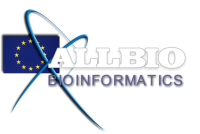
If you are interested in participating this Coordination Action please contact us!
This is an old revision of the document!

KBBE.2011.3.6-02: Supporting the development of Bioinformatics Infrastructures for the effective exploitation of genomic data: Beyond health applications.
Coordinator: Dr. Erik Bongcam-Rudloff
Introduction
The completion of the human genome sequence has triggered worldwide bioinformatics efforts to unravel its information content. Many projects have been successfully completed in areas such as gene hunting, functional annotation, post-translational modification prediction, protein-protein interactions, transcriptomics, or systems biology. These projects have produced large numbers of novel analytic and predictive computer programs. The majority of these developments, though, have focused on harvesting the human genome, transcriptome, proteome, epigenome, etcetera, and considerably less effort has been invested in the thousands of other genomes in life science research fields related to unicellular organisms, plants, or animals. The AllBio partners have selected these three fields as focus for their coordination actions because: 1) all AllBio partners already have extensive experience in collaborating with life scientists in at least one of these fields, and 2) these three fields cover a large number of the activities in the FP7 work programme KBBE-2011, “FOOD, AGRICULTURE AND FISHERIES, AND BIOTECHNOLOGY”.
Coordination through collaboration
All the partners in AllBio have a strong motivation to work on generic bioinformatics theory, technology, and application. They will now coordinate the generalisation and the broadening of the applicability of the many human-centric bioinformatics facilities that were originally designed for the purpose of analysing the human genome sequence and the subsequently collected post (human) genomic datasets. They will also coordinate the design of novel software and databases. This will primarily be research in projects they are actively involved in, but when possible also in third-party projects. These activities require that the partners start to structure and coordinate their collaborations with national researchers in life sciences such as biotechnology, cell biology, functional and comparative genomics, or biochemistry, and carry these collaborations to an international level.
European dimension
Non-human life science communities exist with different degrees of scientific coordination, and some areas have already agreed on ontologies and common procedures and standards. But only few efforts have gone into the wider task of harmonizing the research efforts of these communities. This coordination will require that the partners collaborate on a series of activities such as the design of ontologies for data and methods, and choosing common interoperability standards. These activities, by necessity require that the coordination efforts of this Coordination Action take place at a Europe-wide scale because databases, software, and human expertise have to come together that simply are not available at any national scale. The fact that the activities described in this project all are core-activities to AllBio consortium members will greatly enhance the overall success and the longevity of the results of this bioinformatics coordination project.